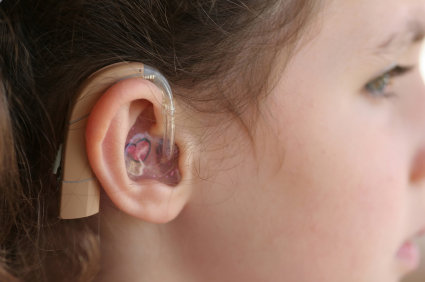Pay Attention To Your Child’s Hearing
If you follow Miracle-Ear on Twitter and are interested in hearing-related issues, you may have come across a worrying article recently. It seems that the number of teens experiencing hearing problems is increasing – with one in six now having some form of preventable hearing loss, as opposed to one in eight back in the 1990s. The study, which was carried out by researchers at the Penn State College of Medicine, also found that 96% of 700 parents surveyed didn’t think that their teenagers were at serious risk of developing hearing impairment. Because of this, fully two-thirds of the parents in the study hadn’t talked to their teens about the risks of listening to damaging noises such as loud music on earphones.

Image source: http://www.lateonsethearingloss.org/wp-content/uploads/2012/04/young_girl_hearing_aid1.jpg
While the report discussed the impact of high frequency hearing loss in teens – along with some of the more common causes – what it didn’t highlight is that hearing problems can start at a much earlier age. Of course, some children are deaf at birth, but there is also evidence that hearing in children under the age of 12 can be permanently affected by noises that are less dangerous later on in life.
The problem is that the sound receptors – or hair cells – in a young child’s ear are much more susceptible to damage. As children, we have about 20,000 of these receptors in each ear, and maintain this number as we grow into adulthood. However, receptors in children’s ears are much more delicate than those in adults, and therefore are more susceptible when strong sounds make them vibrate. Once a receptor is damaged, it is damaged for life – so we have no way to compensate for what we do when we’re younger.
Parents are often not aware just how low the threshold is for doing damage to a child’s hearing. For instance, even a moderately loud television – not blaring – can cause significant harm. Because the damage to the receptors is painless, parents also have no way of telling when damage is being done.
In order to prevent unnecessary hearing loss in children, parents should be extremely cautious. For example, if they want to turn the stereo up high, then it is a good idea to wait until children have gone to bed, or are out of the house. Similarly, if children are exposed to loud traffic noise or even the noise from a lawnmower, their hearing should be protected using earplugs.

Image source: http://themombuys.com/wp-content/uploads/2013/09/baby-food-grinder.jpg
It is possible to detect the early symptoms of hearing loss in children. For babies, look for them to respond to simple sounds, and for their language skills to start to develop normally as they approach 18 months old – if they don’t, there may be an issue. In older children, check for signs such as their turning up the volume too high on the television, having problems in school, or even watching what others do before they follow instructions themselves. If you see any of these signs, then it’s time for a visit to the family doctor or pediatrician.
